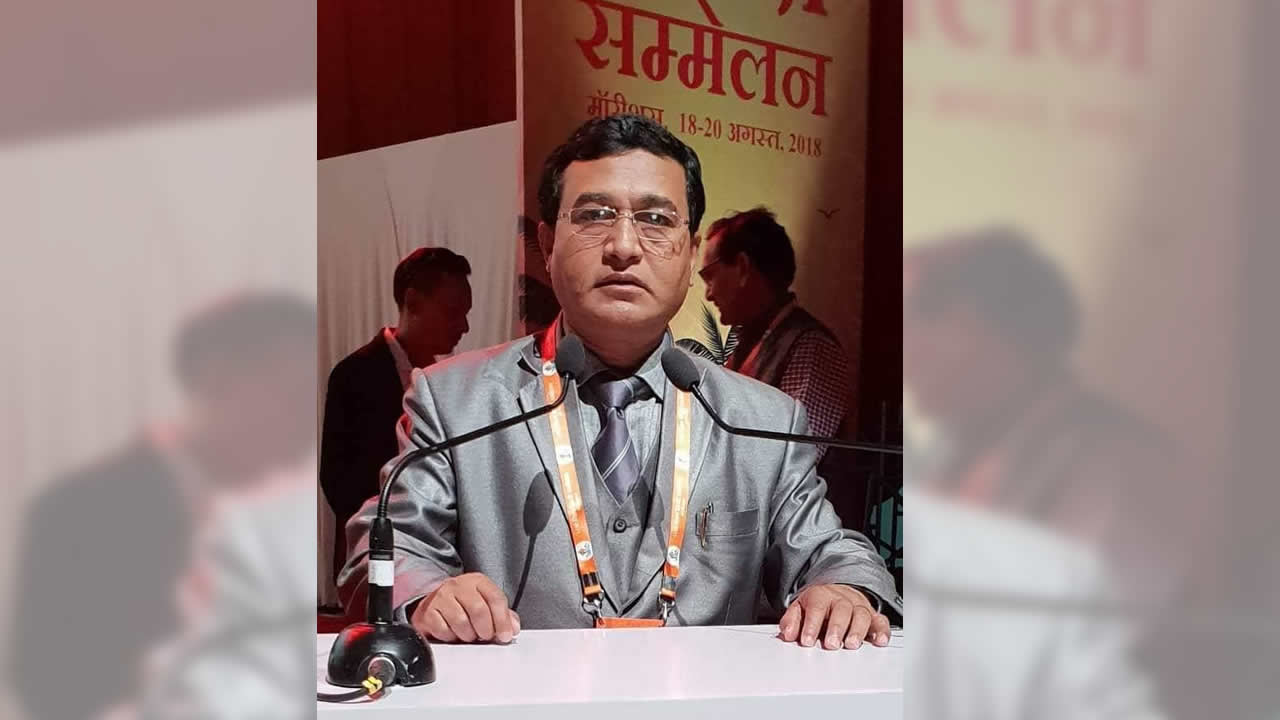
A Memorandum of Understanding was signed on 30th May 2016 at the MGI between the Indian Council for Cultural Relations (ICCR) and MGI Institute for the setting up of a Chair in Hindi language at the MGI. In November the same year, Professor Umesh Kumar Singh from Wardha University, India, arrived in Mauritius as Hindi Chair at MGI. Now after two years, Professor Umesh Singh has completed his tenure and is going back to India. I met him to learn about his experience as the first Hindi Chair of Mauritius, what his perception of Mauritius was before coming here and how his thinking has evolved about this place in the past two years.
With the various programmes of studies in Hindi being run at tertiary level in Mauritius, an expert of international repute in the field of Hindi was needed for capacity-building and also for increasing both students and teaching staff exposure to international practices in this field. The Chair was expected to promote the teaching of Hindi and Indian culture in Mauritius.
Professor Singh says: “Before coming to Mauritius, I thought of this place as just another Indian Diaspora where people are used to speak in Bhojpuri, and in this context, they follow all practices of the Indian culture. But when I came here, I realized that this place is more than what I thought about it, of course in better ways. The way the Indian descendants have made this island so beautiful with their hard work is commendable. The only thing that disappointed me was that their language of expression has shifted from Bhojpuri to Creole. Bhojpuri and Hindi are not mere languages. They are a whole culture in themselves. They are helpful in keeping ancestral values and in the preservation of culture, rituals and passing it on to the next generation. If language is lost, culture is lost. Although I am very happy to see elderly people talking in Bhojpuri, I am a bit concerned as to who is going to take this language forward, as the new generation doesn’t bother to use Hindi and Bhojpuri in their daily activities.”
Indian studies abroad
Professor Singh highlights the reason behind the setup of this Chair in Mauritius. “The ICCR has established Chairs of Indian Studies in various countries, where they send academics from India to promote some specific field. The purpose of these Chairs, apart from educating foreign students, is to become a nucleus for the dynamic development of capacity and interest in Indian Studies in academic institutions abroad. At present there are two ICCR chairs at MGI, Moka. The first is for Sanskrit & Indian Philosophy and the second one is for Hindi. A MoU has already been signed for Ayurveda Chair with the University of Mauritius.”
He further informs: “The academics deputed to these Chairs do not only teach courses on various aspects of India from politics & economy to society & culture, but through other academic activities like research guidance, seminar co-ordination, publications, delivering public lectures, develop scholarly interactions with the academics of that country and assist in disseminating information on India and in creating a better appreciation of various India-related issues.”
Comforting island
When asked about what he liked most about Mauritius, Professor Singh was quick to answer: “Its beauty.” Then he added, the “multicultural aspect of the island is also very interesting. It is a comforting sight to see all religions living peacefully.”
Suggestions
Professor Singh says that “the main reason why students don’t do better in Asian languages is that the teacher uses Creole as a medium to explain all concepts. How can you then expect the students to start using this language? Eighty percent of teacher’s communication should be in the language that they are teaching if they want to see results. Teachers should connect the language with culture, as learning a language is like learning a whole culture.”
Benefits of Chair
The professor lists the following regarding how a Chair can help to improve the level concerning Hindi language: “People want instant results. This kind of academic’s activities gives results in the long term. My tenure is complete and I am satisfied with what I have done here. I have published seven papers on different aspects of Mauritius including Baithaka, Diaspora, among others, in renowned magazines and I have tried my best to inspire teachers and students to do research as well.
Now the next person will come with new ideas and new teaching methods and it will enrich the academic culture in Mauritius. We are trying to create a new generation of writers, poets and dramatists in Mauritius.
Teacher should read more if they want to teach and students should attend classes if they want to learn. That’s how it works. As a my farewell note, I would like to say that students should communicate as much as they can in the language they want to learn and teachers should keep inspiring students to communicate by being good communicators themselves,” concludes Professor Singh.
 J'aime
J'aime













